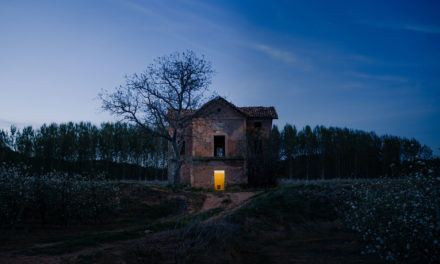You just didn’t do that in our perfect, proper cul-de-sac.
You also didn’t watch “Diners, Drive-Ins and Dives” in the garage. In your boxers. With the garage door open. Or stink up the whole street with an outdoor fish fry every Saturday afternoon. Nobody did those things in our little neighborhood. Until my dad moved in.
After Nick died, Dad said having my boys and me looking after him would be good now that he was almost 80. Truthfully, he’d been fine on his own since Mom passed five years earlier, certainly better than me after Nick’s accident. But I wasn’t going to call his bluff.
A week later, he was out there pushing my mower in nothing but homemade jorts and flip-flops, my neighbors all sneering at him from behind their dust-free blinds.
Dad wasn’t disrespectful; that never was his intention, anyway. The man who studied his Bible and prayed for an hour every morning had always done his best to “love your neighbor as yourself.” He just never much cared about what that neighbor thought of him.
His immunity to embarrassment led to plenty of embarrassment for me as a kid. “Dina, if you love God and love others,” he said in those moments of mortification, “someone’s crummy opinion of you is their problem, not yours.”
I loved my dad but I hated that quote. I supposed he would say that was my problem.
I once asked Mom if Dad’s indifference to others’ opinions bothered her. “It did, at first,” she admitted. “Then I began to see it as a kind of superpower, and I loved him even more for it.” But where she saw superhuman strength, I just saw kryptonite.
After Mom died, Nick, the boys and I settled into our new life in our new home in our new neighborhood. It was the house we’d always wanted, and yet as neighbors welcomed us with cookies in hand, I felt like an outsider.
“Oh, and Dina,” Janet said the day we met, “our next HOA meeting – that stands for ‘Home Owners’ Association,’ sweetie – is in two weeks. I’ll bring you the handbook, so come prepared!”
We tried our best to abide by the guidelines in that handbook, but Janet would ring our doorbell when we missed something, smiling sweetly, to say, “We’ve got a problem, Dina.”
Those reminders were annoying early on but then Janet showed up the week after Nick died. “Oh, sweetie,” she said with her head cocked to one side and what I assumed was intended to be an empathetic frown. “I thought you all could use some brownies.” Then she glanced over her shoulder, cringing slightly. “Do you need help bringing your garbage cans up from the curb? They’ve been there two days.”
That was my last encounter with Janet until she told me how “interesting” she found Dad’s mowing pattern. She later chose more pointed words for the jorts, garage matinees and weekend fish fries.
Then came Christmas. Dad loved the movie “Christmas Vacation” and, after Mom died, he insisted his lights, ornaments, nativity scenes, yard figurines and inflatables be spared from the garage sale.
The day after Thanksgiving, a week before the start of our neighborhood’s decorating season, Dad had our property glowing and blinking and twinkling more extravagantly than anything my neighbors had ever seen.
The result: our first emergency HOA meeting, and the first in my home. Janet requested to speak to Dad directly but he had no interest in talking to someone “with a gigantic candy cane up her butt.”
I dropped fresh flowers into a vase on the table, hoping a little color would soothe the tension I felt. HOA meetings were always intense. This was different.
Janet and her husband predictably arrived first; the last couple knocked just before 7:00.
“Sweetie, let’s examine some of the…choices…your father’s made.” I’d come to detest that smile. “We’ve prepared a list of complaints to discuss.”
Two hours later, my head throbbed. Janet listed things I hadn’t known about, but the embarrassment I typically felt for Dad’s actions was strangely absent.
“Dina?” Janet shook me from my thoughts. “You okay?”
“Sorry. Just tired.”
Her concern changed to that familiar and infuriating look of pity. “Understandable. Your father’s adding stress at a most inopportune time.”
“I’ll try to rein him in,” I conceded, unable and unwilling to counter.
“Good,” she answered, smiling and patting my hand. “Please do.”
Relieved the meeting had concluded, I followed my neighbors toward the door and heard a collective gasp as they walked outside. I stepped onto the porch to find our once-festive yard now vacant.
“Merry Christmas!” Dad shouted from across the street, waving wildly and grinning proudly. He turned back to his work, wrapping a final strand of his beloved multicolored lights around a bush in Janet’s yard. Stepping back, he turned to admire all four neighbors’ houses, each with an obnoxious Christmas display that would make Clark W. Griswold and his family proud.
Janet turned slowly toward me, eyes wide. “We’ve got a big problem, Dina.”
“You’re absolutely right, Janet,” I grinned as I started to close the door. “You do.”
Submitted to the Spring 2020 Writer’s Weekly 24-Hour Short Story Contest.
Prompt: Bluebonnets danced around her white skirt as she turned her face toward the sun. She only needed a few for the vase. Perhaps a little joy would soothe the inevitable unease at the table that night. It was always tense when meeting with her neighbors. She hoped enough time had passed. They had to know there was nothing she could do to change what had happened, right?
Photo by Tim Foster on Unsplash





